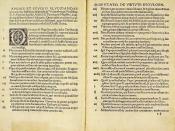I feel that both the Protestant Reformation and the Scientific Revolution have had an equal influence on the religious nature of Europe in 1500 to 1800. But I also am convinced that the Scientific Revolution had a longer lasting influence in Europe. The Reformation destroyed the unity of faith and religious organization of the Christian peoples of Europe, cut many millions off from the true Catholic Church, and robbed them of the greatest portion of the valuable means for the cultivation and maintenance of the supernatural life. Immeasurable harm was thus created from the religious standpoint. The false fundamental principle of justification by faith alone, taught by the Reformers, produced a regrettable shallowness in religious life. Passion for good works disappeared, the simplicity which the Church had practiced from her foundation was despised, charitable and religious objects were no longer properly cultivated, supernatural interests fell into the background, and naturalistic aspirations aiming at the purely ordinary, became widespread.
The denial of the Divinely instituted authority of the Church, both as regards doctrine and religious government, opened wide the door to every strangeness, gave rise to the endless division into sects and the never-ending disputes characteristic of Protestantism, and could not but lead to the complete unbelief which necessarily arises from the Protestant principles. Of real freedom of belief among the Reformers of the sixteenth century there was not a trace; on the contrary, the representatives of the Reformation displayed the greatest tyranny in matters of conscience. Thus arose from the very beginning the various Protestant "national Churches", which are entirely discordant with the Christian universalism of the Catholic Church, and depend, alike for their faith and organization, on the will of the secular ruler. In this way the Reformation was a chief factor in the evolution of royal absolutism. In...



Zakki
informative paper
0 out of 0 people found this comment useful.